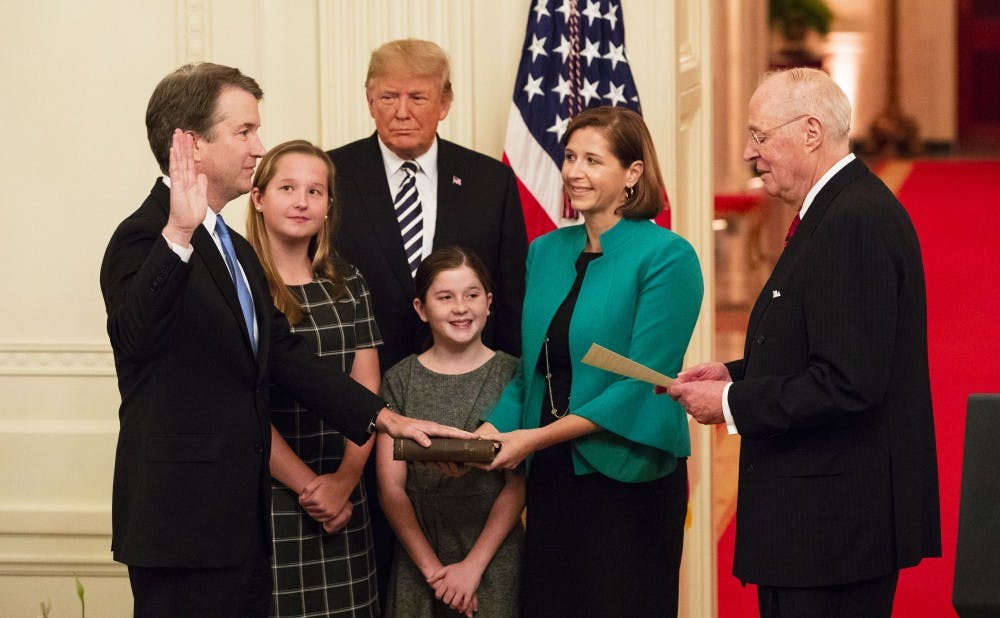One month after Brett Kavanaugh, associate justice of the Supreme Court, was sworn in, Duke students are not yet done discussing the hotly contested confirmation.
Senior Hannah Rogers and junior Matthew Noles discussed Kavanaugh's temperament and standards for appointing judges to the Supreme Court in a debate Thursday hosted by Duke Political Union.
In her opening statement, Rogers argued that regardless of the sexual assault allegations, Kavanaugh's behavior during the Senate hearings proved him to be incapable of serving as a justice on the Supreme Court and lowered the standard for future nominees.
Noles, who recently wrote a guest column in The Chronicle on the subject, opened by first clarifying some of the points he made in his original column. The junior said that he in no way condones sexual assault, but that Kavanaugh's opponents rushed to judgement and presumed he was guilty. Noles said that it was "worth remembering these are human beings on the Supreme Court.
Fritz Mayer, professor in the Sanford School of Public Policy, moderated the debate. He asked Rogers and Noles why it was just or unjust to appoint Kavanaugh.
"To not confirm Justice Kavanaugh would have set a precedent that an accusation is enough [to not confirm]," Noles said. "That precedent is the most dangerous in my mind."
Rogers said that this was not the precedent that should be set for a future Supreme Court Justice.
Mayer then asked what the standard should be when it comes to appointing judges to the Supreme Court.
Rogers compared the Senate hearing to a job interview, explaining the standard of evidence should be lower than that of a criminal trial to ensure the best possible judges sit on the Supreme Court.
"As long as we have a reasonable suspicion that Brett Kavanaugh is not capable of reaching the standards we have set for a Supreme Court justice—those standards being impartiality, respect for the law, consistency with one's constitutional interpretations and awareness to step away from the party that judge may be associated with in defense of the Constitution—then I don't think that he's entitled to the job," she said.
Noles agreed that this case was not a criminal trial. However, he said that it was not simply a job interview either.
"If you set [the standard] so low, then what happens when a Democratic president comes to the White House, and it would be their nominee next time around," he asked. "It is not difficult for another accusation alone to be interpreted as reasonable suspicion."
Rogers responded by saying that even if Christine Blasey Ford—who accused Kavanaugh of sexually assaulting her when they were in high school—did not come forward, there would still be ample evidence that Kavanaugh was incapable to serve on the Supreme Court.
Mayer then turned the discussion to temperament, asking both debaters to comment on the importance of Kavanaugh's behavior during the Senate hearing.
Noles compared Kavanaugh's evaluation to Duke's admissions process, saying that the University judges students holistically instead of based on one test score. Instead, people should consider the FBI's investigations of him that did not find evidence to corroborate Ford's narrative and those who commended his character.
"If we're going to talk about his temperament, character and ability, I would say let's look at his 311 judicial hearings," Noles said.
Rogers said that respect is an important aspect of the judicial branch's authority.
"I do think that temperament is paramount," Rogers said. "The people who are sitting on the Supreme Court are making decisions that are century-defining, era-making. In order for those decisions to be honored and upheld, not only do we have to have respect for the institutions that own them, we also have to have respect for the people who make those decisions, and know that their intentions are to make America a better place."
Get The Chronicle straight to your inbox
Signup for our weekly newsletter. Cancel at any time.

